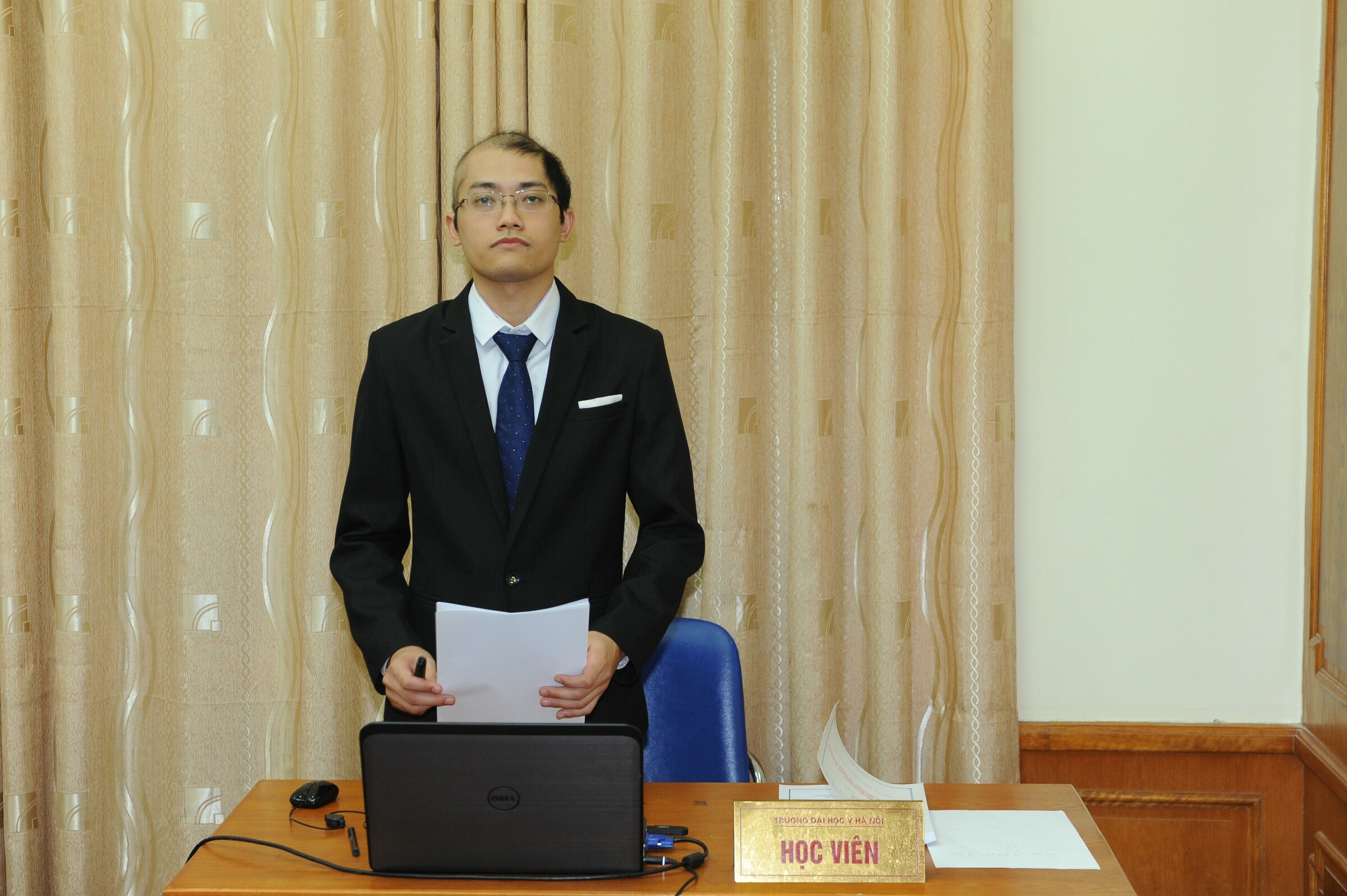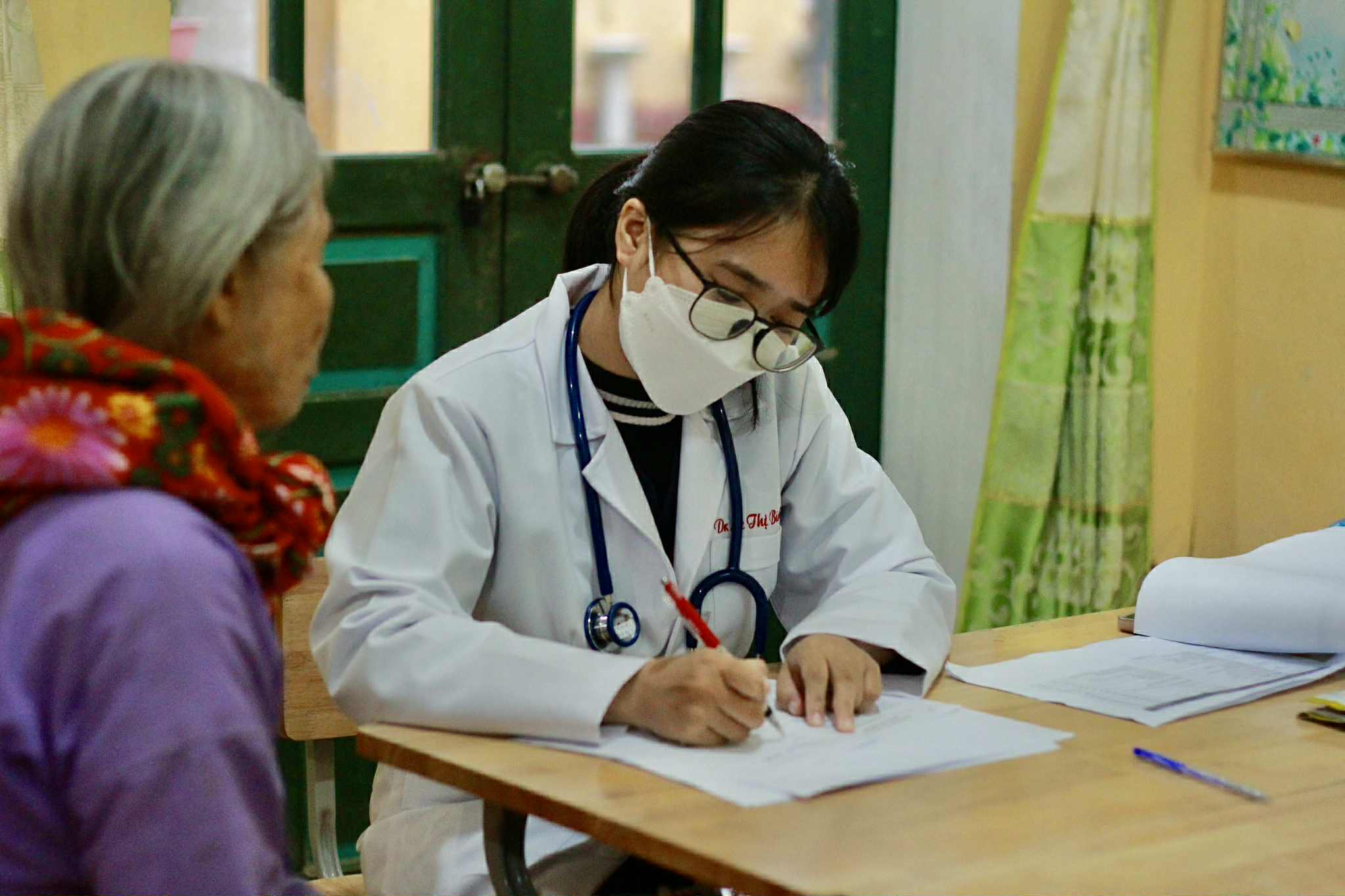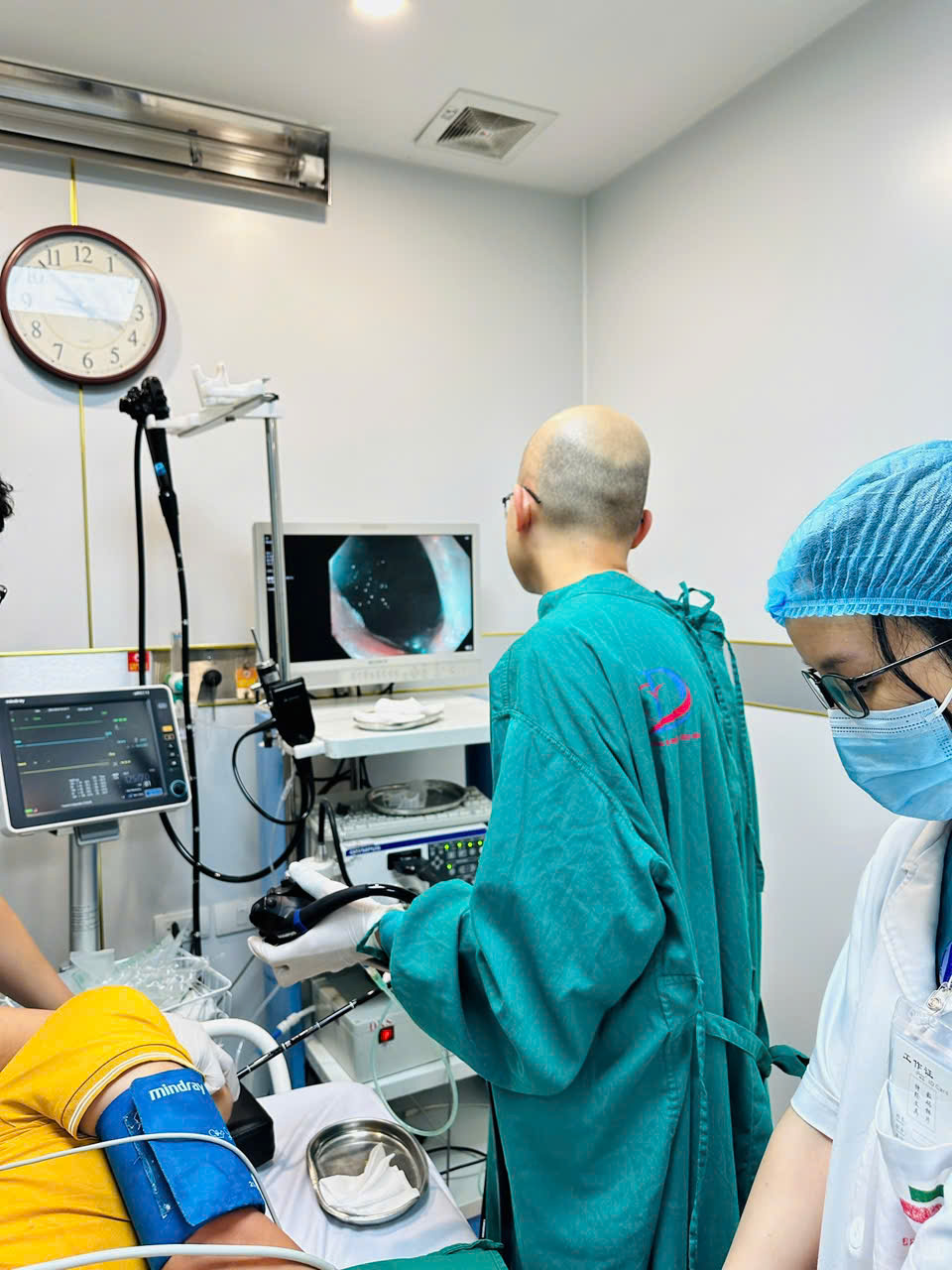Residency is considered the fastest track to becoming a skilled physician in Vietnam. This postgraduate training program is reserved for exceptional medical students, and each student has only one opportunity to take the entrance exam. If accepted, they embark on a rigorous three-year journey with an immense workload and academic pressure. In return, they receive guidance from leading professors and doctors, building a solid professional foundation that often takes others decades to achieve.
To enter this program, aspiring doctors must face a fiercely competitive exam. In 2014, Dr. Hoang Van Chuong, a recent internal medicine graduate from Hanoi Medical University, had to review 720 essay questions across six specialized subjects.
"By question 700, I had completely forgotten the first one," recalls the now 35-year-old Dr. Chuong. "Many students had to resort to tranquilizers to focus, and some even gave up midway."
 |
Dr. Chuong takes a commemorative photo before his residency graduation defense in 2017, at Hanoi Medical University. Photo: Tu Le |
Dr. Chuong takes a commemorative photo before his residency graduation defense in 2017, at Hanoi Medical University. Photo: Tu Le
His chosen specialty, internal medicine, is considered the "heart" of clinical medicine, encompassing cardiology, pulmonology, gastroenterology, nephrology-urology, hematology, and rheumatology. Internists not only develop systematic thinking and differential diagnosis skills but also serve as the core force in coordination and consultation. Consequently, out of over 100 resident doctors, only 12 belonged to the Department of Internal Medicine, and Dr. Chuong was one of four specializing in gastroenterology.
The persistent academic pressure caused significant hair loss for Dr. Chuong. Once he officially began his residency, large bald patches started appearing on his head. "Most resident doctors become gaunt, age rapidly, and experience graying or hair loss," he shares.
Dr. Chuong worked approximately ten 24-hour shifts each month. Even after a shift, he would remain at the hospital until 10 PM the following day. Sometimes, he wouldn't get home to shower until 3 AM, only to return to work by 7 AM. With over 150 patients in the department, resident doctors were required to know each patient's condition thoroughly. "Any mistake, and the attending physician would call out the resident doctor first," he recounts.
Facing high expectations and immense pressure, resident doctors were frequently reprimanded, sometimes even in front of patients and colleagues. The most stressful situations were in the emergency room, dealing with multiple critical patients simultaneously. "Sometimes, while attending to one critical patient, another's condition would deteriorate," Dr. Chuong recalls.
Half-bald, standing at 5'7" but weighing only 123 pounds, Dr. Chuong was nicknamed "the walking stick." In his final year of residency, he met a junior female colleague. "Back then, I had no time to date anyone outside the hospital," he says. However, their demanding schedules left them with little time for their relationship, leading to its eventual end.
 |
Dr. Ngoc examines a patient during a field trip to Yen Bai in 2023. Photo courtesy of the subject |
Dr. Ngoc examines a patient during a field trip to Yen Bai in 2023. Photo courtesy of the subject
Le Quynh, the wife of a resident doctor from the 42nd class, shares that only after living with her husband did she truly understand their hardships. Childhood sweethearts, they married as Nguyen, her husband, began his residency. "As newlyweds, my husband was on duty three days a week. Even on days off, he would stay at the hospital until 10 PM, coming home only to collapse into sleep," she recounts.
Once, Ms. Quynh returned home from work, knowing her husband was asleep inside, but couldn't wake him despite banging on the door. "I banged so hard that the door latch broke, yet he remained oblivious. Over an hour later, he woke up, saw me cooking, asked a question, and went straight back to sleep," she shares. Many nights, she was startled awake by her husband's sleep-talking, shouting as if he were in the midst of an emergency at the hospital.
The pressure of residency is even greater for female doctors like 26-year-old Le Thi Bich Ngoc. Once, after a brief lull in patients at 10 PM in the A9 Emergency Department of Bach Mai Hospital, Dr. Ngoc grabbed a quick dinner. Returning 20 minutes later, she found the department's status board had turned red – a signal indicating the highest level of emergency. The atmosphere was tense, filled with the rapid beeping of monitors and terse medical commands.
Three doctors were taking turns performing CPR, along with other resuscitation techniques, to revive a patient who had suffered cardiac arrest outside the hospital. Dr. Ngoc immediately joined the effort. After 40 minutes of relentless work, the monitor finally displayed signs of life. At that moment, the young doctor's eyes welled up.
"The male patient was only in his early thirties, and outside the emergency room doors were his parents, wife, and children who needed him," Dr. Ngoc recalls. "The moment I saw his heart beating again, I knew I had done something worthy of my profession."
Dr. Bich Ngoc is currently a third-year resident, specializing in internal medicine with a focus on rheumatology. "Internal medicine provides me with a foundation that I will use throughout my medical career, whether I pursue research, teaching, or specialized practice," she explains.
For the past three years, Dr. Ngoc has practiced primarily in the Department of Internal Medicine, also working in the A9 Emergency Department of Bach Mai Hospital and Hanoi Medical University Hospital. Working where the line between life and death is so thin, she admits to facing immense pressure from her specialty, supervising professors, colleagues, and patients' families.
Despite being a woman, Dr. Ngoc's shifts and workload are no different from her male counterparts. Her day begins at 7 AM and ends at 10 PM, with three 24-hour shifts per week. Getting 2-3 hours of sleep is considered a luxury. There are no summer breaks during the three years of residency, and even Tet holidays are limited. Many nights, she would come home and fall into a dead sleep as soon as her head hit the pillow. "We often joke that 'we live only for night shifts'," she says.
Dr. Bich Ngoc feels fortunate to have had her boyfriend's support throughout the past five years. They married earlier this year, but plans for children are on hold until after her graduation. She notes that due to the intense pressure, most resident doctors don't consider starting families, and many haven't even been in a relationship. In previous years, marriages were rare, and pregnancies were almost taboo.
"The three years of residency are arduous, but they're also a glorious journey of youth that every doctor wants to experience," Dr. Ngoc reflects. For her, it's like a forge – a place where physical, mental, and intellectual limits are tested. But it's also the journey that helps her mature, become more confident and resilient on the path to becoming a skilled physician.
 |
Dr. Chuong (in green) performs an endoscopy on a patient at the clinic, 9/2025. Photo: Tu Le |
Dr. Chuong (in green) performs an endoscopy on a patient at the clinic, 9/2025. Photo: Tu Le
The same holds true for Hoang Van Chuong. He has become the doctor he aspired to be. However, his half-bald head never fully recovered. Eventually, he opted to shave his head completely "for a cleaner look."
After working at Bach Mai Hospital, Dr. Chuong transitioned to a private hospital in Hanoi, hoping to continue his profession while having more time for his family and preparing for their second child.
Ms. Quynh and her husband have also returned to Thanh Hoa. Her husband is now a lecturer at Hanoi Medical University, Thanh Hoa campus, and a doctor at the provincial hospital. Instead of shouldering the burden as she did during his residency, the pharmacist now runs a small pharmacy at home and cares for their children.
"After that difficult journey, I'm now content that my husband can provide for our family and help many patients, fulfilling his professional ideals," Ms. Quynh shares.
Pham Nga - Phan Duong












